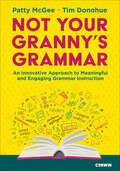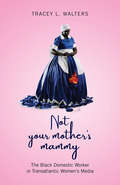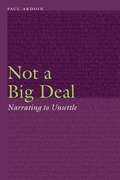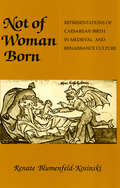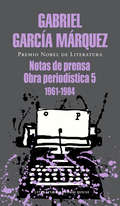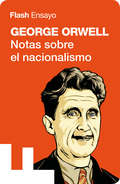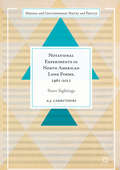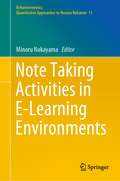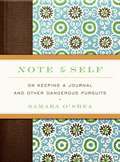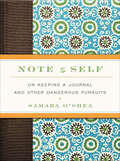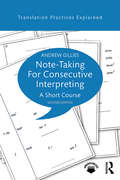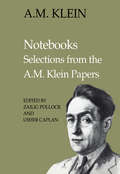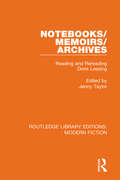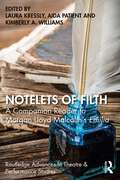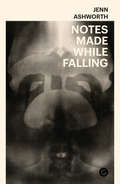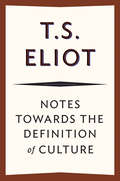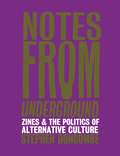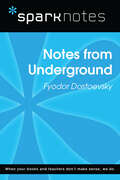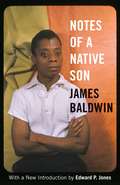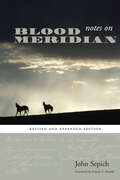- Table View
- List View
Not Your Granny’s Grammar: An Innovative Approach to Meaningful and Engaging Grammar Instruction
by Patricia Grawehr McGee Timothy J DonohueLet′s make grammar instruction exciting, relevant, and accessible for all learners! Grammar is the forgotten foundational skill! It plays a critical role in helping students become skilled readers and writers. Yet, traditional approaches to teaching grammar, through drills and memorization, no longer resonate with students. In today′s fast-paced world, students need a more engaging and meaningful way to learn grammar that connects to their real-world experiences. That′s where Not Your Granny′s Grammar comes in—offering an innovative approach to teaching grammar that is both efficient and effective. In this book, authors Patty McGee and Tim Donohue introduce Grammar Study, their classroom-tested approach that blends explicit instruction and inquiry to address the challenges and gaps in traditional grammar lessons. The book includes 40+ engaging and innovative, research-based lessons that are organized in flexible lesson progressions to provide teachers with easy-to-implement, fun, and learning-rich experiences for students in Grades 2-8. Guiding educators step-by-step in nurturing grammar knowledge and usage for both themselves and their students, this book Offers lessons and strategies that allow students to study grammar in the context of everyday reading and writing Emphasizes that grammar is not a static set of rules but an ever-evolving system that differs from community to community Provides time management principles for teachers to creatively integrate meaningful grammar instruction into their literacy or ELA block Highlights the importance of grammar in writing and clarifies the difference between spoken and written grammar Includes a robust grammar refresher to help teachers feel more confident in their grammar knowledge as well as an appendix showing alignment with Common Core Standards Drawing from the science of writing, Not Your Granny′s Grammar revolutionizes grammar instruction so teachers can help students build actionable and detailed grammar knowledge and skills that enrich their academic writing for years to come.
Not Your Mother's Mammy: The Black Domestic Worker in Transatlantic Women’s Media
by Tracey L WaltersNot Your Mother’s Mammy examines how black artists of the African diaspora, many of them former domestics, reconstruct the black female subjectivities of domestics in fiction, film, and visual and performance art. In doing so, they undermine one-dimensional images of black domestics as victims lacking voice and agency and prove domestic workers are more than the aprons they wear. An analysis of selected media by Alice Childress, Nandi Keyi, Victoria Brown, Kara Walker, Mikalene Thomas, Rene Cox, Lynn Nottage, and others provides examples of generations of domestics who challenged their performative roles of subservience by engaging in subversive actions contradicting the image of the deferential black maid. Through verbal confrontation, mobilization, passive resistance, and performance, black domestics find their voices, exercise their power, and maintain their dignity in the face of humiliation. Not Your Mother’s Mammy brings to life stories of domestics often neglected in academic studies, such as the complexity of interracial homoerotic relationships between workers and employers, or the mental health challenges of domestics that lead to depression and suicide. In line with international movements like #MeToo and #timesup, the women in these stories demand to be heard.
Not a Big Deal: Narrating to Unsettle (Frontiers of Narrative)
by Paul ArdoinNot a Big Deal asks how texts might work to unsettle readers at a moment when unwelcome information is rejected as fake news or rebutted with alternative facts. When readers already recognize &“defamiliarizing texts&” as a category, how might texts still work toward the goals of defamiliarization? When readers refuse to grapple with texts that might shock them or disrupt their extant views about politics, race, or even narrative itself, how can texts elicit real engagement? This study draws from philosophy, narratology, social neuroscience, critical theory, and numerous other disciplines to read texts ranging from novels and short stories to graphic novels, films, and fiction broadcasted and podcasted—all of which enact curious strategies of disruption while insisting that they do no such thing. Following a model traceable to Toni Morrison&’s criticism and short fiction, texts by Kyle Baker, Scott Brown, Percival Everett, Daniel Handler, David Robert Mitchell, Jordan Peele, and Colson Whitehead suggest new strategies for unsettling the category-based perceptions behind what Everett calls &“the insidious colonialist reader&’s eye which infects America.&” Not a Big Deal examines problems in our perception of the world and of texts and insists we do the same.
Not a Butterfly Alphabet Book: It's About Time Moths Had Their Own Book!
by Jerry PallottaThis nature alphabet book from best-selling author Jerry Pallotta features moths (not butterflies!) of all shapes and sizes.Meet dozens of moths--and a few bonus creatures--with engaging text and a laugh-out-loud narrative, from A (Atlas Moth) to G (Green Lips Moth--no kissing allowed!) to J (Jersey Tiger Moth, whose underwings are a completely different color than their upper wings, not to be confused with their underwear) to Z (Zigzag Moth). Readers of all ages will be entertained (and learning!) with every page turn.
Not of Woman Born: Representations of Caesarean Birth in Medieval and Renaissance Culture
by Renate Blumenfeld-Kosinski"Not of woman born, the Fortunate, the Unborn"—the terms designating those born by Caesarean section in medieval and Renaissance Europe were mysterious and ambiguous. Examining representations of Caesarean birth in legend and art and tracing its history in medical writing, Renate Blumenfeld-Kosinski addresses the web of religious, ethical, and cultural questions concerning abdominal delivery in the Middle Ages and the Renaissance. Not of Woman Born increases our understanding of the history of the medical profession, of medical iconography, and of ideas surrounding "unnatural" childbirth.Blumenfeld-Kosinski compares texts and visual images in order to trace the evolution of Caesarean birth as it was perceived by the main actors involved—pregnant women, medical practitioners, and artistic or literary interpreters. Bringing together medical treatises and texts as well as hitherto unexplored primary sources such as manuscript illuminations, she provides a fresh perspective on attitudes toward pregnancy and birth in the Middle Ages and the Renaissance; the meaning and consequences of medieval medicine for women as both patients and practitioners, and the professionalization of medicine. She discusses writings on Caesarean birth from the twelfth and thirteenth centuries, when Church Councils ordered midwives to perform the operation if a mother died during childbirth in order that the child might be baptized; to the fourteenth century, when the first medical text, Bernard of Gordon's Lilium medicinae, mentioned the operation; up to the gradual replacement of midwives by male surgeons in the fifteenth and sixteenth centuries. Not of Woman Born offers the first close analysis of Frarnois Rousset's 1581 treatise on the operation as an example of sixteenth-century medical discourse. It also considers the ambiguous nature of Caesarean birth, drawing on accounts of such miraculous examples as the birth of the Antichrist. An appendix reviews the complex etymological history of the term "Caesarean section."Richly interdisciplinary, Not of Woman Born will enliven discussions of the controversial issues surrounding Caesarean delivery today. Medical, social, and cultural historians interested in the Middle Ages and the Renaissance, historians, literary scholars, midwives, obstetricians, nurses, and others concerned with women's history will want to read it.
Not so Very Long Ago: Reading 3 Part B for Christian School
by staff of Bob Jones University FacultyLiterary anthology for Christian schools
Notas de prensa: Obra periodística, 5 (1961-1984)
by Gabriel García MárquezEl lector quedará recompensado con los casi doscientos artículos de este quinto volumen de la obra periodística de García Márquez. Personajes de la política, de la cultura o, simplemente, de la vida; libros, películas, ciudades visitadas y vividas; denuncias, recuerdos, miedos confesables -como a los aviones-, y la pregunta a la que se enfrenta todo escritor: ¿cómo se escribe una novela? Abra por donde abra estas Notas de prensa (1961-1984), el lector quedará recompensado con la lectura de los casi doscientos artículos breves que integran el quinto volumen de la obra periodística de Gabriel García Márquez. Porque cada uno de ellos es una pequeña pieza magistral donde brillan la pluma ágil, a la que nada escapa, de uno de los grandes escritores de la litearatura contemporánea. Originalmente publicado en 1991, la presente edición para la Biblioteca García Márquez incorpora seis nuevas notas, escritas entre 1961 y 1973.
Notas sobre el nacionalismo (Colección Endebate #Volumen)
by George OrwellGeorge Orwell ofrece una de las reflexiones más lúcidas sobre los nacionalismos. En tiempos como los que estamos viviendo, los nacionalismos y los extremismos en todas sus formas resurgen con fuerza. En este extraordinario ensayo, publicado en mayo de 1945, en los estertores de la Segunda Guerra Mundial, George Orwell establece una definición del nacionalismo que vas más allá del vínculo con un lugar geográfico, como un pernicioso estado de rigidez mental en el que no tiene cabida ni el debate ni la reflexión.
Notational Experiments in North American Long Poems, 1961-2011
by A. J. CarruthersThis book is a critical experiment that tracks the literary and poetic uses of musical notation and notational methods in North American long poems from the middle of last century to the contemporary moment. Poets have readily referred to their poems as "scores. " Yet, in this study, Carruthers argues that the integration of musical scores in expansive works of this period does more work than previously thought, offering both resolution and escape from the demands placed on long poem form. The five case studies, on Langston Hughes, Armand Schwerner, BpNichol, Joan Retallack and Anne Waldman, offer approaches to reading literary scores in what might be described as a critical stave or a critical "fugue" of instances. In differing ways, musical notation and notational methods impact the form, time and sometimes the ethical and political stances of these respective long poems.
Note Taking Activities in E-Learning Environments (Behaviormetrics: Quantitative Approaches to Human Behavior #11)
by Minoru NakayamaThe main focus of this book is presenting practical procedures for improving learning effectiveness using note taking activities during e-learning courses. Although presentation of e-learning activities recently has been spreading to various education sectors, some practical problems have been discussed such as evaluation of learning performance and encouragement of students. The authors introduce note taking activity as a conventional learning tool in order to promote individual learning activity and learning efficacy. The effectiveness of note taking has been measured in practical teaching in a Japanese university using techniques of learning analytics, and the results are shown here. The relationships between note taking activity and students’ characteristics, the possibility of predicting the final learning performance using metrics of students’ note taking, and the effectiveness for individual emotional learning factors are evaluated. Some differences between blended learning and fully online learning courses are also discussed. The authors provide novel analytical procedures and ideas to manage e-learning courses. In particular, the assessment of note taking activity may help to track individual learning progress and to encourage learning motivation.
Note to Self: On Keeping a Journal and Other Dangerous Pursuits
by Samara O'SheaKeeping a journal is easy. Keeping a life-altering, soul-enlightening journal, however, is not. At its best, journaling can be among the most transformative of experiences, but you can only get there by learning how to express yourself fully and openly. Enter Samara O'Shea. O'Shea charmed readers with her elegant and witty For the Love of Letters. Now, in Note to Self, she's back to guide us through the fun, effective, and revelatory process of journaling. Along the way, selections from O'Shea's own journals demonstrate what a journal should be: a tool to access inner strengths, uncover unknown passions, face uncertain realities, and get to the center of self. To help create an effective journal, O'Shea provides multiple suggestions and exercises, including: Write in a stream of consciousness: Forget everything you ever learned about writing and just write. Let it all out: the good, bad, mad, angry, boring, and ugly. Ask yourself questions: What do I want to change about myself? What would I never change about myself? Copy quotes: Other people's words can help you figure out where you are in life, or where you'd like to be. It takes time: Don't lose faith if you don't immediately feel better after writing in your journal. Think of each entry as part of a collection that will eventually reveal its meaning to you. O'Shea's own journal entries reveal alternately moving, edgy, and hilarious stories from throughout her life, as she hits the party scene in New York, poses naked as an aspiring model, stands by as her boyfriend discovers an infidelity by (you guessed it) reading her journal, and more. There are also fascinating journal entries of notorious diarists, such as John Wilkes Booth, Anaïs Nin, and Sylvia Plath. A tribute to the healing and reflective power of the written word, Note to Self demonstrates that sometimes being completely honest with yourself is the most dangerous and rewarding pursuit of all.
Note to Self: On Keeping a Journal and Other Dangerous Pursuits
by Samara O'SheaKeeping a journal is easy. Keeping a life-altering, soul-enlightening journal, however, is not. At its best, journaling can be among the most transformative of experiences, but you can only get there by learning how to express yourself fully and openly. Enter Samara O'Shea. O'Shea charmed readers with her elegant and witty For the Love of Letters. Now, in Note to Self, she's back to guide us through the fun, effective, and revelatory process of journaling. Along the way, selections from O'Shea's own journals demonstrate what a journal should be: a tool to access inner strengths, uncover unknown passions, face uncertain realities, and get to the center of self. To help create an effective journal, O'Shea provides multiple suggestions and exercises, including:Write in a stream of consciousness: Forget everything you ever learned about writing and just write. Let it all out: the good, bad, mad, angry, boring, and ugly.Ask yourself questions: What do I want to change about myself? What would I never change about myself? Copy quotes: Other people's words can help you figure out where you are in life, or where you'd like to be.It takes time: Don't lose faith if you don't immediately feel better after writing in your journal. Think of each entry as part of a collection that will eventually reveal its meaning to you.O'Shea's own journal entries reveal alternately moving, edgy, and hilarious stories from throughout her life, as she hits the party scene in New York, poses naked as an aspiring model, stands by as her boyfriend discovers an infidelity by (you guessed it) reading her journal, and more. There are also fascinating journal entries of notorious diarists, such as John Wilkes Booth, Anaïs Nin, and Sylvia Plath.A tribute to the healing and reflective power of the written word, Note to Self demonstrates that sometimes being completely honest with yourself is the most dangerous and rewarding pursuit of all.
Note-Taking/Reading Study Guide Grade 6
by Mcdougal LittelContains: *Two-Page Study Guide for Each Section of the Textbook Promotes Active Reading, & *Note-Taking Handbook Models A Variety of Graphic Organizers for Taking Notes and Building Vocabulary
Note-taking for Consecutive Interpreting: A Short Course (Translation Practices Explained)
by Andrew GilliesNote-taking for Consecutive Interpreting: A Short Course is the essential step-by-step guide to the skill of note-taking. The system, made up of a range of tried and tested techniques, is simple to learn, consistent and efficient. Each chapter presents a technique, with examples, tasks and exercises. This second edition has been extensively revised throughout, including: an updated chapter on speech analysis new chapters on comparisons and links revised example speeches and notes a summary of other authors' note-taking guidelines for comparison and reference (Part III). The author uses English throughout – explaining how and where to locate material for other languages – thus providing a sound base for all those working in the areas of conference interpreting and consecutive interpreting in any language combination. This user-friendly guide is a particularly valuable resource for student interpreters, professionals looking to refresh their skills, and interpreter trainers looking for innovative ways of approaching note-taking.
Notebooks
by A. M. Klein Zailig Pollock Usher CaplanMuch of A.M. Klein's finest prose is to be found in the mass of uncompleted work that he abandoned at the time of his breakdown, and that became accessible only when his papers were deposited in the National Archives. Notebooks offers a generous selection of this work, revealing previously unsuspected facets of Klein's character and artistry.The fiction, criticism, and memoirs collected here focus on Klein's exploration of the role of the artist. The works illuminate crucial periods of his career, especially the early 1940s, when he was transforming himself into a modernist, and the early 1950s, when he was struggling to overcome the misgivings about his art that were to lead to his final breakdown.The semi-autobiographical text which Klein referred to as 'Raw Material' and the unfinished novel of prison life entitled 'Stranger and Afraid' cast a new light on Klein's often frustrating relationship with the Montreal Jewish community. In 'Marginalia' he discusses poetic form and technique and makes observations on the nature of poetry, thereby providing insights into his own concerns as a writer. In 'The Golem,' a profoundly ambiguous treatment of the act of creation, a self-portrait emerges of a storyteller who has lost faith in the power and value of his story. The volume includes a critical introduction, that places the material in the context of Klein's other works, as well as textual and explanatory notes.
Notebooks 1942-1951
by Albert Camus Justin O'BrienInsight into the evolution of some of the Nobel Prize winner's famous works is provided through the compilation of quotations and commentaries that reveal the nature of the author's spiritual, intellectual, and moral conflicts.
Notebooks/Memoirs/Archives: Reading and Rereading Doris Lessing (Routledge Library Editions: Modern Fiction #24)
by Jenny TaylorSince The Grass is Singing was published in 1950, Doris Lessing has commanded a widespread and heterogeneous readership. Written from a feminist political perspective, and employing diverse modes of critical analysis, the present volume, originally published in 1982, aims to combine detailed technical exploration of Lessing’s work with a sense of this extraordinary writer’s historical, political and personal development. The essays, placed in political and biographical context by the editor’s introduction, span the entire length of Lessing’s career, up to Canopus in Argos, and includes studies of A Man and Two Women, The Golden Notebook and The Children of Violence as well as an interview with David Gladwell, director of Memoirs of a Survivor.
Notelets of Filth: A Companion Reader to Morgan Lloyd Malcolm's Emilia (Routledge Advances in Theatre & Performance Studies)
by Morgan Lloyd Malcolm Aida Patient Kimberly A. Williams Laura KresslyThis collection of short, accessible essays serves as a supplementary text to Morgan Lloyd Malcolm’s play, Emilia. Critically acclaimed and beloved by audiences, this innovative and ground-breaking show is a speculative history, an imaginative (re)telling of the life of English Renaissance poet Aemilia Bassano Lanyer. This book features essays by theatre practitioners, activists, and scholars and informed by intersectional feminist, critical race, queer, and postcolonial analyses will enable students and their teachers across secondary school and higher education to consider the play’s major themes from a wide variety of theoretical and interdisciplinary perspectives. This volume explores the current events and cultural contexts that informed the writing and performing of Emilia between 2017 and 2019, various aspects of the professional London productions, critical and audience responses, and best practices for teaching the play to university and secondary school students. It includes a foreword by Emilia playwright Morgan Lloyd Malcolm This book will be of great interest to students and scholars of theatre, arts activism, feminist literature, and theory.
Notes Made While Falling (Goldsmiths Press Ser.)
by Jenn AshworthA genre-bending meditation on sickness, spirituality, creativity, and the redemptive powers of writing.Notes Made While Falling is both a genre-bending memoir and a cultural study of traumatized and sickened selves in fiction and film. It offers a fresh, visceral, and idiosyncratic perspective on creativity, spirituality, illness, and the limits of fiction itself. At its heart is a story of a disastrously traumatic childbirth, its long aftermath, and the out-of-time roots of both trauma and creativity in an extraordinary childhood. Moving from fairgrounds to Agatha Christie, from literary festivals to neuroscience and the Bible, from Chernobyl to King Lear, Ashworth takes us on a fantastic journey through familiar landscapes transformed through unexpected encounters and comic combinations. The everyday provides the ground for the macabre and the absurd, as the narration twists and stretches time. Hovering on the edge of madness, writing, it seems, might keep us sane—or might just allow us to keep on living. In Notes Made While Falling, Ashworth calls for a redefinition of the creative work of thinking, writing, teaching, and being, and she underlines the necessity of a fearlessly compassionate and empathic attention to vulnerability and fragility.
Notes Towards the Definition of Culture: Notas Para La Definición De La Cultura (Raíces De Europa Ser.)
by T. S. EliotThis critique of modern society argues that culture must be organic, and cannot be planned or imposed. The word culture has been widely and erroneously employed in political, educational, and journalistic contexts. In helping to define a word so greatly misused, T. S. Eliot contradicts many of our popular assumptions about culture, reminding us that it is not the possession of any one class but of a whole society—and yet its preservation may depend on the continuance of a class system, and that a &“classless&” society may be a society in which culture has ceased to exist. Surveying the post–World War II world, Eliot finds evidence of decay in cultural standards in every department of human activity, and expects the phenomenon to continue. He suggests that culture and religion have a common root—and if one decays, the other may die too. In observing the superpowers of his day and the course of recent history, he reminds us that &“the Russians have been the first modern people to practise the political direction of culture consciously, and to attack at every point the culture of any people whom they wish to dominate.&” The appendix includes Eliot&’s broadcasts to Europe, ending with a plea to preserve the legacy of Greece, Rome, and Israel, and Europe&’s legacy throughout the last two thousand years. &“Behind the urbanity, the modesty, the mere good manners of Mr. Eliot&’s exposition, one cannot mistake the force and significance of what he has to say, or ignore that it constitutes a fundamental attack on most of our assumptions on the subject.&” —The Spectator
Notes from Underground
by Stephen DuncombeMuch history and theory is uncovered here in the first comprehensive study of zine publishing. From their origins in early 20th century science fiction cults, their more proximate roots in '60s counter-culture and their rapid proliferation in the wake of punk rock, Stephen Duncombe pays full due to the political importance of zines as a vital network of popular culture. He also analyzes how zines measure up to their utopian and escapist outlook in achieving fundamental social change. Packed with extracts and illustrations, he provides a useful overview of the contemporary underground in all its splendor and misery.
Notes from Underground (SparkNotes Literature Guide Series)
by SparkNotesNotes from Underground (SparkNotes Literature Guide) by Fyodor Dostoevsky Making the reading experience fun! Created by Harvard students for students everywhere, SparkNotes is a new breed of study guide: smarter, better, faster. Geared to what today's students need to know, SparkNotes provides: *Chapter-by-chapter analysis *Explanations of key themes, motifs, and symbols *A review quiz and essay topicsLively and accessible, these guides are perfect for late-night studying and writing papers
Notes of a Native Son
by James Baldwin Edward P. JonesA new edition published on the twenty-fifth anniversary of Baldwin's death, including a new introduction by an important contemporary writer Since its original publication in 1955, this first nonfiction collection of essays by James Baldwin remains an American classic. His impassioned essays on life in Harlem, the protest novel, movies, and African Americans abroad are as powerful today as when they were first written. "A straight-from-the-shoulder writer, writing about the troubled problems of this troubled earth with an illuminating intensity." --Langston Hughes, The New York Times Book Review "Written with bitter clarity and uncommon grace." --TimeFrom the Trade Paperback edition.
Notes on Blood Meridian: Revised and Expanded Edition (Southwestern Writers Collection Series, Wittliff Collections at Texas State University)
by John Sepich&“Sepich offers his insight and detailed research to the less knowledgeable reader. He crafts a book that will delight the McCarthy specialists.&” —Western American Literature Blood Meridian (1985), Cormac McCarthy&’s epic tale of an otherwise nameless &“kid&” who in his teens joins a gang of licensed scalp hunters whose marauding adventures take place across Texas, Chihuahua, Sonora, Arizona, and California during 1849 and 1850, is widely considered to be one of the finest novels of the Old West, as well as McCarthy&’s greatest work. The New York Times Book Review ranked it third in a 2006 survey of the &“best work of American fiction published in the last twenty-five years,&” and in 2005 Time chose it as one of the 100 best novels published since 1923. Yet Blood Meridian&’s complexity, as well as its sheer bloodiness, makes it difficult for some readers. To guide all its readers and help them appreciate the novel&’s wealth of historically verifiable characters, places, and events, John Sepich compiled what has become the classic reference work, Notes on Blood Meridian. Originally published in 1993, Notes remained in print for only a few years and has become highly sought-after in the rare book market, with used copies selling for hundreds of dollars. In bringing the book back into print to make it more widely available, Sepich has revised and expanded Notes with a new preface and two new essays that explore key themes and issues in the work. This amplified edition of Notes on Blood Meridian is the essential guide for all who seek a fuller understanding and appreciation of McCarthy&’s finest work.
